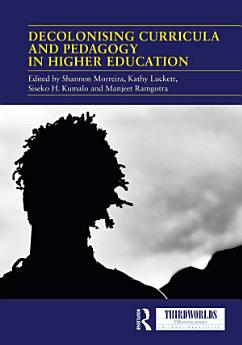Decolonising Curricula and Pedagogy in Higher Education: Bringing Decolonial Theory into Contact with Teaching Practice
About this ebook
Occasionally, a theoretical concept arises in academic debate that cuts across individual disciplines. Such concepts – which may well have already been in use and debated for some time - become suddenly newly and increasingly important at a particular historical juncture. Right now, debates around decolonisation are on the rise globally, as we become increasingly aware that many of the old power imbalances brought into play by colonialism have not gone away in the present.
The authors in this volume bring theories of decoloniality into conversation with the structural, cultural, institutional, relational and personal logics of curriculum, pedagogy and teaching practice. What is enabled, in practice, when academics set out to decolonize their teaching spaces? What commonalities and differences are there where academics set out to do so in universities across disparate political and geographical spaces? This book explores what is at stake when decolonial work is taken from the level of theory into actual practice.
The chapters in this book were originally published as a special issue of Third World Thematics.
About the author
Shannon Morreira is anthropologist and senior lecturer in the Humanities Education Development Unit at the University of Cape Town, South Africa. Her research centres on the impact of coloniality on knowledge systems.
Kathy Luckett is a sociologist of higher education and works as a policy researcher in the Institutional Planning Department, at the University of Cape Town, South Africa.
Siseko H. Kumalo is the Editor of the Journal of Decolonising Disciplines and the recent edited volume entitled Decolonisation as Democratisation: Global Insights into the South African Experience (HSRC Press). His research focuses on higher education decolonisation, epistemic justice, along with feminism and queer theory.
Manjeet Ramgotra is a political theorist at SOAS University of London, UK. Her research examines republicanism in classical European and postcolonial political thought.







